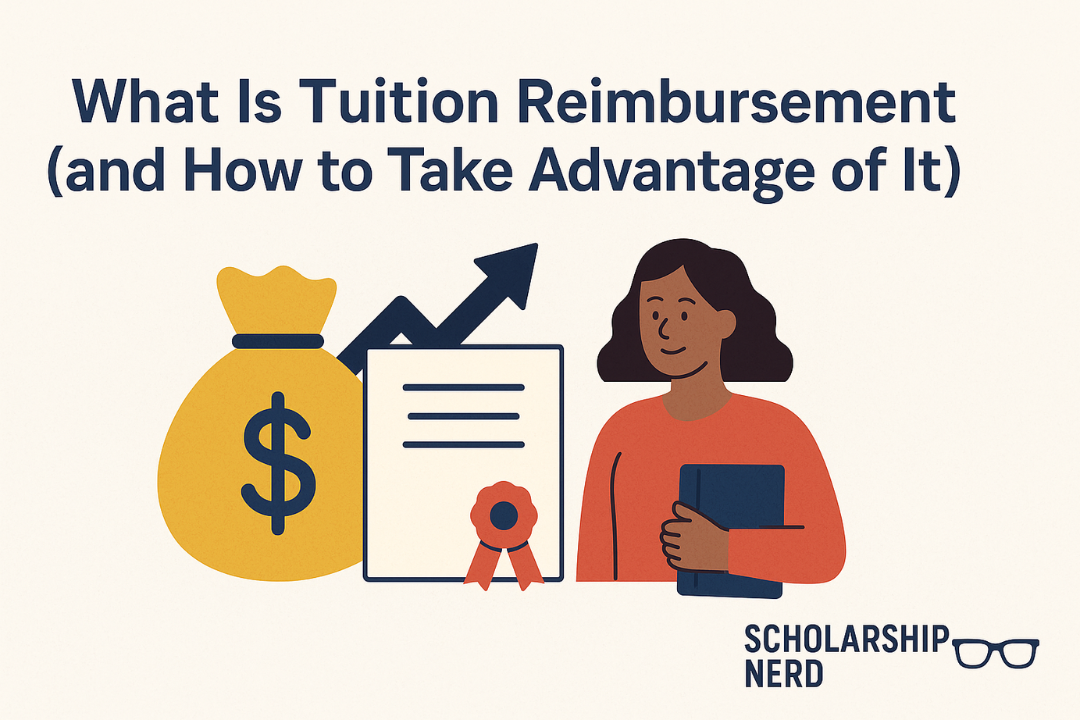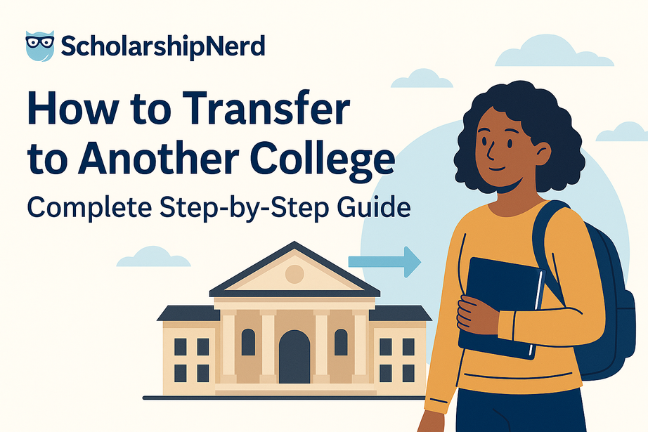Have you been thinking about finishing your degree or trying to figure out how to advance in your current career path? Going back to school sounds like the perfect solution, but one question keeps holding you back: How will I pay for it?
If you’re a working adult balancing bills, family, and career goals, there’s good news. Many employers offer something called tuition reimbursement. This is an employee benefit designed to help you pay for school while you work.
Let’s break down exactly what it is, how it works, and how you can take advantage of it. I’ll also provide guidance on how to combine it with scholarships to make your education truly affordable.
What Is Tuition Reimbursement?
Tuition reimbursement is an employee benefit where companies repay eligible education costs, usually after an employee successfully completes a course. It helps working adults afford college while allowing employers to invest in skill development and retention.
In other words:
- You pay tuition upfront, complete your class or program, and
- Your employer reimburses you later — typically up to a set dollar amount each year.
It’s different from tuition assistance, which covers tuition before you enroll. Both benefits help employees pursue education, but reimbursement gives companies more flexibility and accountability (you’ll often need to pass with a certain grade).
Why Companies Offer Tuition Reimbursement
Employers see tuition reimbursement as a win-win:
- It boosts employee retention and loyalty.
- It helps upskill their workforce.
- It enhances company culture and reputation.
Industries like healthcare, retail, logistics, and tech are especially known for offering education benefits.
How Tuition Reimbursement Works

Every company’s plan is different, but most follow a similar structure:
Some companies even pay schools directly, so employees don’t have to front the cost, like Amazon’s Career Choice and Walmart’s Live Better U.
Tax Perk: IRS Section 127
The IRS allows employers to offer up to $5,250 per year in tuition reimbursement tax-free — meaning neither you nor your employer pays taxes on that benefit. (Source: IRS Publication 15-B)
Benefits of Tuition Reimbursement for Employees
Going back to school as an adult can feel intimidating. But tuition reimbursement makes it more doable than most people realize.
Here’s why it’s such a powerful benefit:
- Saves thousands in tuition and reduces the need for loans.
- Boosts your career mobility by helping you qualify for promotions or new roles.
- Builds confidence as finishing your degree is a huge personal milestone.
- Encourages loyalty to employers who invest in education often retain top talent longer.
Top Companies That Offer Tuition Reimbursement Jobs
Many employers, from retail giants to delivery services, now include tuition reimbursement as part of their benefits package.
Here are some of the most well-known examples:
When job hunting, look for “tuition reimbursement jobs” filters on Indeed or LinkedIn. Be sure not to overlook local hospitals, government agencies, or school districts, which often offer similar benefits.
How to Ask Your Employer About Tuition Reimbursement
If your company doesn’t already have a formal program, don’t be afraid to ask. Many employers are open to education benefits if you can connect them to business goals.
Here’s a simple way to start:
- Check your HR or benefits portal to see if a policy exists.
- If not, propose one. Emphasize how your education supports company goals.
- Use this example script: “I’m enrolling in [degree/certification] that will directly support [team/project]. Could we explore tuition reimbursement or education support options?”
Tips for success:
- Tie your request to ROI. Be specific on how your learning helps the company.
- Include a timeline or outline of costs.
- Follow up professionally if you don’t hear back.
Other Ways to Fund Your Education
Even if your employer doesn’t offer reimbursement, you still have options! We’re here to help you find them.
- Scholarships: Free funding that never needs to be repaid.
- Grants: Federal or state programs like the Pell Grant.
- Employer-university partnerships: Some companies offer discounted tuition for employees.
Find verified scholarships and grants on Scholarship Nerd — no gimmicks, just real opportunities to make college more affordable.
Frequently Asked Questions (FAQ)
How does tuition reimbursement work?
Employees pay tuition upfront and are reimbursed by their employer after meeting requirements like grades and course approval. Many companies offer up to $5,250 per year tax-free under IRS Section 127.
Is tuition reimbursement taxable?
Up to $5,250 per year is tax-free under IRS rules. Any amount above that may be considered taxable income. Always confirm details with HR.
Which companies offer tuition reimbursement?
Major employers like Amazon, Walmart, Starbucks, Target, and UPS offer tuition reimbursement programs covering part or all of employees’ education costs.
Can part-time employees qualify?
Yes, some companies such as UPS and Chipotle offer reimbursement to part-time employees after a probationary period or based on performance.
Can tuition reimbursement cover graduate school?
Some employers extend reimbursement to graduate or MBA programs, often requiring higher grades or longer service commitments.
Take the Next Step Toward Affordable Education
Tuition reimbursement is one of the most underused employee benefits out there, and it could be your key to earning a degree without the financial stress.
If your employer offers it, take advantage. If they don’t, you still have options. Explore verified scholarships and grants with Scholarship Nerd, where every listing is researched, vetted, and real.
You’ve got goals, and we’ll help you find the funding to reach them.
Compliance Notes
- All information is for educational purposes only.
- Scholarship and employer benefits can change — always verify with official sources.
- Content adheres to FTC and U.S. Department of Education guidelines.




